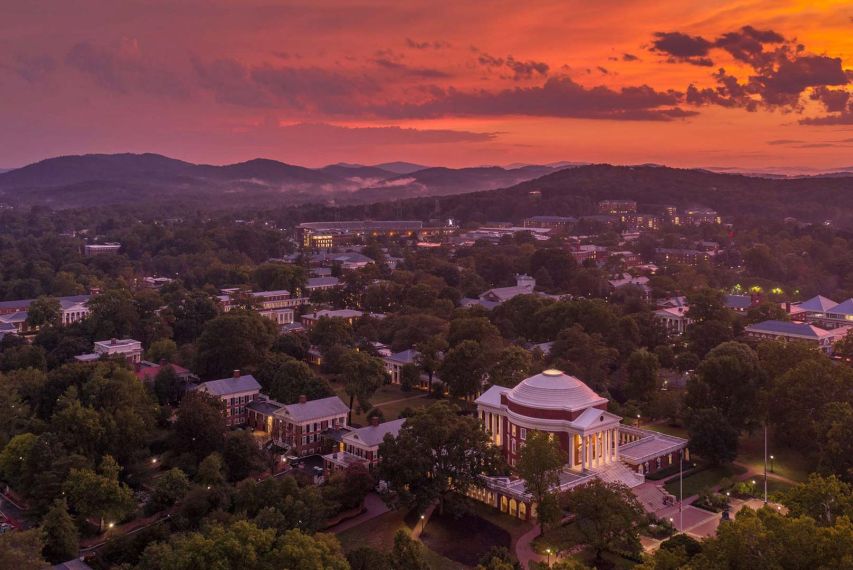In spring 2023, Center for Global Inquiry + Innovation in the Office of the Vice Provost for Global Affairs announced a new round of grants to support global research for faculty and graduate students.15 Center Grants, 2 G-Pods and 30 graduate students were awarded through CGII for their research projects. The grants included smaller ones for individual research (up to $15,000), as well as a second round of the G-Pod for larger collaborative work (up to $100,000).
Some of the smaller projects awarded during the Spring round are:
- Advanced Polymers for Water Purification Applications I Geoffrey M. Geise (Chemical Engineering)
- Arts, Democracy, and Cultural History in Dakar I Janet Horne & Alison Levine (French)
- Contemplative Design Workshop: Applications in Higher Education I Michael Sheehy (Contemplative Sciences Center and Religious Studies Department)
- Ganymede’s Garden: Homoeroticism and the Italian Landscape I Michael G. Lee (Architecture)
- Migrant Nahua Futurisms I Federico Cuatlacuatl (Art)
- Old Wine in New Bottles: The Art of Alcohol across Antiquity I Tyler Jo Smith (Art)
- Picturing Fabrics: Textile and the Photographic Image I Giulia Paoletti (Art)
- The Right to Opacity I Nasrin Olla (English and Africana Studies)
- Toward a History of Bhutanese Art I Ariana Maki (Religious Studies)
- Underground Ambassadors: Queer Theater, Trans Life, and their European Audiences I David J. Getsy (Art)
- The Aegean Islands: Sustainable Human-environmental Transformations from Antiquity to the Anthropocene I Phoebe Crisman (Global Studies)
In addition to center grants, CGII also offered G-Pod to two new projects.
Global Center for Equitable Computer Science Education I Jennie Chiu (Education)
This project aims to understand how to make computer science education equitable and accessible for learners across cultural, social, and economic contexts. Researchers from the University of Virginia, UVA-WISE, and the Universidad del Norte in Colombia will collaborate to investigate computing education through three main activities: (1) conducting classroom research to understand how CS learning happens in elementary contexts in Colombia and the U.S.; (2) Providing professional development (PD) opportunities to teachers and investigating effective PD practices for integrating CS in elementary classrooms; and (3) developing and providing accessible and low-cost computational tools for young children.
Indigenous Communities and Tallgrass Prairie Resilience in the Face of Changing Climate: A Science, Education, and Co-Design Research Collaboration I UVA Co-PIs: Phoebe Crisman (Architecture); David Edmunds (Global Development Studies); Howard Epstein (Environmental Sciences); Lora Henderson Smith (Education)
Lake Traverse Reservation team: Dustina Gill, Nis’to, Inc., WaziyataWin, Makoce Ikikcupi
Other UVA Faculty partners: Lauren Simkins (Environmental Sciences); Jennie Chiu (Education)
Changing climate requires resilient ecological systems, human communities, and built environments. This research examines coupled human–environment systems of tallgrass prairies, Indigenous peoples, and their ways of living and learning. UVA faculty and students from architecture, environment science, global studies, and education are collaborating with Sisseton Wahpeton Oyate NGO partners Nis’to and Makoce Ikikcupi on their Lake Traverse Reservation in South Dakota. Intersectional research objectives and implementation encompass three areas: Science best practices to restore and maintain vital tallgrass prairie ecosystems with climate change; Design strategies for ecologically and culturally sustainable architecture, landscape, and infrastructure; and Education methods and knowledge co-production.
In addition to the faculty grants, 30 graduate students also received CGII funding for their dissertation projects.




